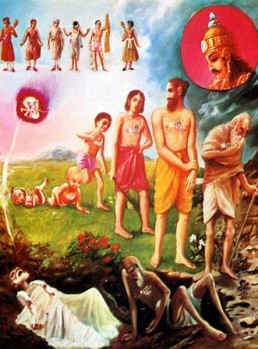Swami Chinmayananda Commentary
Adi Sankara Commentary
Pumsah, in the case of a person; dhyayatah, who dwells on, thinks of; visayan, the objects, the specialities [Specialities: The charms imagined in them.] of the objects such as sound etc.; upajayate, there arises; sangah, attachment, fondness, love; tesu, for them, for those objects. Sangat, from attachment, from love; sanjayate, grows; kamah, hankering, thirst. When that is obstructed from any quarter, kamat, from hankering; abhijayate, springs; krodhah, anger. Krodhat, from anger; bhavati, follows; sammohah, delusion, absence of discrimination with regard to what should or should not be done. For, an angry man, becoming deluded, abuses even a teacher. Sammohat, from delusion; (comes) smrti-vibhramah, failure of memory originating from the impressions acquired from the instructions of the scriptures and teachers. When there is an occasion for memory to rise, it does not occur. Smrti-bhramsat, from that failure of memory; (results) buddhi-nasah, loss of understanding. The unfitness of the mind to discriminate between what should or should not be done is called loss of understanding. Buddhi-nasat, from the loss of understanding; pranasyati, he perishes. Indeed, a man continues tobe himself so long as his mind remains fit to distinguish between what he ought to and ought not do. When it becomes unfit, a man is verily ruined. Therefore, when his internal organ, his understanding, is destroyed, a man is ruined, i.e. he becomes unfit for the human Goal. Thinking of objects has been said to be the root of all evils. After that, this which is the cause of Liberation is being now stated: [If even the memory of objects be a source of evil, then their enjoyment is more so. Hence, a sannyasin seeking Liberation cannot avoid this evil, since he has to move about for food which is necessary for the maintenance of his body. The present verse is an answer to this apprehension.]
The Bhagavad Gita with the commentary of Sri Sankaracharya – Translated by Alladi Mahadeva Sastry
Holy Geeta – Commentary by Swami Chinmayananda
The Bhagavad Gita by Eknath Easwaran – Best selling translation of the Bhagavad Gita
The Bhagavad Gita – Translation and Commentary by Swami Sivananda
Bhagavad Gita – Translation and Commentary by Bhaktivedanta Swami Prabupadha
Srimad Bhagavad Gita Chapter 2 – Verse 62 – 2.62 dhyayato vishayan – All Bhagavad Gita (Geeta) Verses in Sanskrit, English, Transliteration, Word Meaning, Translation, Audio, Shankara Bhashya, Adi Sankaracharya Commentary and Links to Videos by Swami Chinmayananda and others – 2-62

